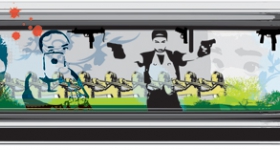Six ascending notes on a xylophone was the dream sequence that called me to our family’s TV throughout my childhood. Mysterious and otherworldly, the jingle promised a new misadventure in magic every time. A guitar solo followed, with Sabrina the Teenage Witch appearing across the screen in bubbly pink letters. Friday evenings were spent this way: sitting cross-legged in front of the TV and basking in Sabrina’s bubbliness.
Sabrina the Teenage Witch was in its third season by the time my family left Vietnam for Los Angeles in 1998. I gave myself entirely to the storyline of this quirky teenager navigating life as a witch in the fictional Boston suburb of Westbridge. The white Victorian house in which she lived with her two eccentric aunts, complete with gingerbread trimming and a picturesque turret, captured my fantasies every time the establishing shot appeared.
From the show, I developed an obsession with New England and its history. I spent hours learning about the pilgrims’ first years in America and Paul Revere’s midnight ride. All around me, the culture I witnessed was one that romanticized the 13 colonies. Elementary school lessons cast colonial America in such a friendly light, and I was enamored with it all. Every November, we made pilgrim hats, complete with tiny golden buckles cut from construction paper. We colored in cartoons of these settlers and Native Americans holding hands or sharing corn. Every fall I wished the trees in Los Angeles would let go of their green in exchange for warmer colors.
I related deeply to Sabrina’s story even though she and I looked nothing alike. We were, after all, two girls tasked with finding stability despite our foreign identities. Half mortal and half witch, she hid her magic the same way I hid my Vietnamese self. During the show’s first Halloween special, Sabrina was introduced to the holiday’s significance to her family. She was torn when she wanted to go to a party hosted by her crush but was obligated to attend a distant aunt’s dinner party. I watched that episode with my mother. I was 7 at the time and translated for her every now and then when she asked me for an update.
“Why are there two of her?” My mother interjected in Vietnamese when Sabrina cast a spell to clone herself. We were eating a dinner of white rice and cà ri gà, and she waved her chopsticks toward the TV, sending a spray of curry into the air. I poked my own chopsticks into my bowl, in search of chicken and an answer. My mother and I consumed TV in this collaborative way for years before she discovered Vietnamese channels. Today we do the same with her Vietnamese shows; she explains the story to me when characters speak too quickly, or when the cleverness of our language escapes me.
“Because she wants to be in two places at once,” I replied as Sabrina sent her clone to the house party. “Her aunts want her to go to this family dinner but she was invited to a friend’s party.” I talked to her with my mouth full of rice. We always talked to each other with our mouths full at meal times, each thought too pressing to wait for the chewing to be over.
Taking leave in Vietnamese culture includes a set of niceties that unfolds with game-like precision. Etiquette calls for slowness; departing with haste could come across as rude. Every visit paid to one of my mother’s friends stretched on by the doorway with phrases of endearment exchanged until there was nothing else to say but goodbye.
“She should go to the family event!” My mother said it with such confidence, the same way she would chastise me later during my teenage years every time I asked to spend the night at a friend’s house. At 7, I already felt that tugging at the edge of my consciousness every time a friend invited me over for dinner. It came from a place of fear, of not knowing what would happen to her children in this strange land if she let us out of her sight.
“No,” I would reply to my friends even though I wanted to say “yes.”
“Why not?” A girl asked me one day. I could only get away with saying “no” so many times without pushback. Josefine was my first friend in America and lived in the same apartment complex, yet that was still too far away for my mother.
“My mom’s making dinner,” I said flatly, hoping she would accept it and let it go.
“Doesn’t she make dinner every night?”
She waited for me to answer. “It’s a special dinner,” I said, even though it wasn’t. “Gotta go, bye!”
I raced away down the alleyway connecting our apartments and returned to my home where my mother stood in front of a boiling pot, stirring and stirring, pausing only to taste her concoction with the tip of her spoon.
“Gotta go, bye!” was just one of the many pieces of knowledge I folded into my everyday expressions after watching the latest episode of Sabrina the Teenage Witch. The phrase was a tell-tale sign that she was up to something, a quick and finite way of removing herself from any situation to scutter off toward mischief. I thought it sounded very American to declare one’s sudden departure without regard to any arguments that could arise in response. The swiftness of “gotta go” and the power of an exclaimed “bye!” was something I practiced by myself, often with difficulty trying to render it with the same emphasis. Taking leave in Vietnamese culture includes a set of niceties that unfolds with game-like precision. Etiquette calls for slowness; departing with haste could come across as rude. Every visit paid to one of my mother’s friends stretched on by the doorway with phrases of endearment exchanged until there was nothing else to say but goodbye.
“Tell your sisters that I say hello and that I hope they’re healthy,” my mother would say to avoid one such sister commenting behind her back, “Hmm, that woman didn’t ask about me?”
“Of course! And you tell your sisters that I say the same.”
Outside, the Los Angeles sunset would blaze with orange and pink each time the exchange took place, fading into a deep green, then to dark blue as stars appeared and cars passed by with headlights turned on. Finally, when even the palm trees began to wave in the nighttime breeze, my mother would put on her shoes, open the door, tell me to say goodbye and head out into the cool air. As we passed each building on the way home, I could feel the day’s warmth releasing itself from the stucco walls.
At the end of every episode, her problems were solved and she was able to sit by the window with her black cat, Salem. She got to look out into the night sky with a resolution that I didn’t know how to reach in my own life. She could pass as normal. I was Vietnamese and would always be Vietnamese. There was no disguising that.
Sabrina the Teenage Witch was an education in the ways of cute schoolboys and pancake breakfasts. There was the time in season three, episode five, when Sabrina discovered the Spellman weakness for pancakes. A single bite led to cravings so overwhelming that she hosted a pancake breakfast at her high school for the opportunity to devour as many pancakes as she could. It was the first time I ever saw a stack of pancakes, layered neatly and glistening with maple syrup. A square of butter sat on top. I followed Sabrina’s hand as she brought a piece of pancake to her mouth. I didn’t know what it was, but I recognized the same idyllic image on a cardboard box at the grocery store the next day and asked my mother to purchase it.
Without any experience, we produced pancakes that were neither neat nor fluffy. I bit into one and was met with raw batter encased in a charred shell. It was a waste of money, my mother clucked. “Why try to do these American things?” She swayed back and forth with her hands on her back, pregnant with my younger brother. She shook her head as she slid our failed pancakes into the trash.
Sabrina lived a double life and juggled her fair share of identity issues, but on the surface, she had privilege that I didn’t: blond hair, blue eyes and white skin. My magic was an entire race and culture that visibly set me apart from the other kids at school. I often struggled with this while watching the show — loving and hating Sabrina, cheering her on, yet envious of her at the same time. At the end of every episode, her problems were solved and she was able to sit by the window with her black cat, Salem. She got to look out into the night sky with a resolution that I didn’t know how to reach in my own life. She could pass as normal. I was Vietnamese and would always be Vietnamese. There was no disguising that.
Still, I drank in Sabrina’s magic and the New England environment that surrounded it. I was taken by the fake autumns and manufactured snow storms, scenes I took to be reality until a friend pointed out to me in college that the show was filmed at a studio in Los Angeles. I laughed then, at the memory of my younger self worshipping sets that must have been filmed somewhere near my hometown. It was amusing to imagine Sabrina bundled up for a beautiful fall scene, yet sweating in the summer heat.
After college, I moved to Boston for graduate school, the unspoken motive being that I wanted to experience Sabrina’s New England for myself. I visited Salem during my first October in the area. Many friends warned me to be careful and told me that I was walking into a Halloween tourism nightmare. I was willing to take the risk, if only to see trees ablaze with reds and oranges in the town that Sabrina and her aunts spoke about so often.
When I got there, the scent of cinnamon seemed to be everywhere. Buses crowded with tourists moved through the narrow streets, always with a boisterous announcer at the front. The speakers shouted out gruesome details about the Salem Witch Trials, turning heads as they drove by. Usually sleepy during the off-season, the town’s storefronts drew in crowds by the dozens and before long, everyone on the street had either a tiny witch hat or a flowing black cloak.
My stomach was uneasy with it all as I took in the sight of trash scattered across the historic cemetery, visitors wandering off the designated paths and onto graves. I was a part of it too, showing up the weekend before Halloween with romantic notions of strolling through the town’s old side streets to take pictures of the architecture and foliage. I didn’t know how to appreciate the cobblestoned streets and historical sites without thinking about the women who lost their lives there.
In Boston, a similar disillusionment descended. The city’s past stung my fantasies with its racism and segregation and its patriotism built on the backs of others. No American town is untouched by these issues, but the letdown in Boston felt something akin to making pancakes with my mother for the first time. The city’s middle was too raw, its shell too charred in comparison to the image that I had dreamed up from Sabrina episodes.
In the years since the show’s series finale, I have rewatched the show several times. Every time, the show became less about guidance and more about nostalgia, though tinged with disappointment. It was most difficult to overlook the moments when Sabrina the Teenage Witch was openly problematic. There was the time she cast a spell to make herself a kung fu expert. The episode, unfortunately titled “Sweet and Sour Victory,” played on clichés for laughs. In season two, Sabrina’s Quiz Master was characterized by Black stereotypes throughout his time in the series. There were also the many instances when gender came into play, turning a show with three female leads into an opportunity for reinforcing stereotypes about women. These jokes haven’t aged well, but the part of me that’s still a little girl fresh off a cross-Pacific plane ride is the part that holds onto the pure excitement of catching a new Sabrina episode. The show itself was a cornerstone of so many evenings my mom and I spent together in front of our TV.
I threw my first Sabrina the Teenage Witch Halloween special party during my second fall in Boston. It was exactly what it sounds like: a few friends supplied with spooky-themed snacks — ghost-shaped potato chips, pumpkin creme cookies, bat chocolates. We borrowed someone’s Hulu account and found every Halloween special from the series, from the one with the clones to the one with the caffeinated zombies. For the first time, I was able to watch the show for what it was without glorifying it. There was nothing for me to learn from Sabrina that night.










Comments